I bought you this book
新概念英语第二册课文
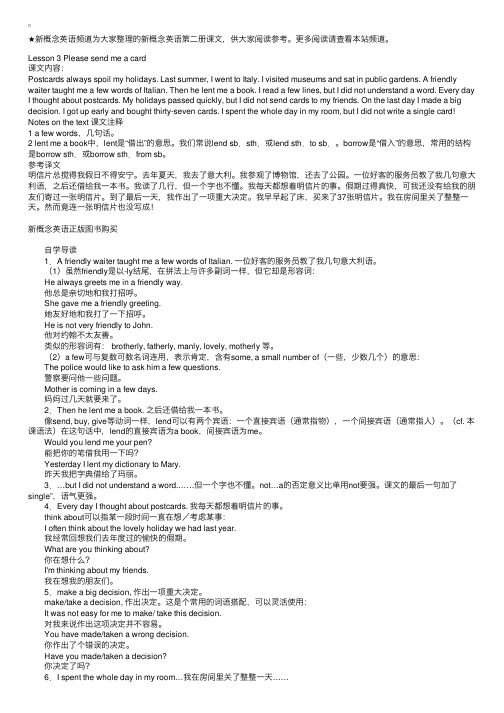
★新概念英语频道为⼤家整理的新概念英语第⼆册课⽂,供⼤家阅读参考。
更多阅读请查看本站频道。
Lesson 3 Please send me a card课⽂内容:Postcards always spoil my holidays. Last summer, I went to Italy. I visited museums and sat in public gardens. A friendly waiter taught me a few words of Italian. Then he lent me a book. I read a few lines, but I did not understand a word. Every day I thought about postcards. My holidays passed quickly, but I did not send cards to my friends. On the last day I made a big decision. I got up early and bought thirty-seven cards. I spent the whole day in my room, but I did not write a single card! Notes on the text 课⽂注释1 a few words,⼏句话。
2 lent me a book中,lent是“借出”的意思。
我们常说lend sb.sth.或lend sth.to sb.。
borrow是“借⼊”的意思,常⽤的结构是borrow sth.或borrow sth.from sb。
参考译⽂明信⽚总搅得我假⽇不得安宁。
去年夏天,我去了意⼤利。
我参观了博物馆,还去了公园。
⼀位好客的服务员教了我⼏句意⼤利语,之后还借给我⼀本书。
我读了⼏⾏,但⼀个字也不懂。
新概念英语第二册答案详解

新概念英语第二册答案详解每课的选择题:Lesson 1: bcbdc adbac ccLesson 2: cdcca bbadc dbLesson 3: cacac bccba bbLesson 4: dbabb acbca ccLesson 5: cadbc dabcb bdLesson 6: dacdd adaba daLesson 7: bccda cdacb abLesson 8: dbbac cbbad bbLesson 9: cbdaa bbdbb dcLesson 10: addcb cacac caLesson 11: bbbab ccacc bdLesson 12: ccadd adacd aaLesson : 13 bdbca bbcaa adLesson 14: bcacd bcbcb bbLesson 15: dbcbc dadcc cbLesson 16: aadab adadd daLesson 17: dbbdc cbaac adLesson18 : Bdbdb cdcac cbLesson 19: Adccd bcbca ccLesson 20: Bcbbc bcacc daLesson 21 : cdcda cbbad ccLesson 22: dbddb dacda bbLesson 23: aaacc addbb adLesson 24: baaca acccb abLesson 25: cbbab cdbaa daLesson 26: adcbc ddabd bdLesson 27: dcddd baddc ccLesson 28: cdbbc dbdcd baLesson 29: bccbd babbb cbLesson 30: aadab cccda ddLesson 31: dbaca adabc acLesson 32: cccbb cadad bcLesson 33: dbdac bbccc acLesson 34: dabca dcbcb caLesson 35: adadd adaba ddLesson 36: addcd ccbad ccLesson 37: cbbbb dacdb baLesson 38: bcaac bddba ddLesson 39: dacdd abacc abLesson 40: ccbca acbbb bdLesson 41: aacdc bbada cbLesson 42: dddbb cddac daLesson 43: bbaad daccd acLesson 44: cbccc bdaba bdLesson 45: bdabb dcbcb dbLesson 46: acdda cbcad caLesson 47: dabad aaddc ac Lesson 48: cbcba cbbda bc Lesson 49: dabab ccacc aa Lesson 50: dbacc aadbb cd Lesson 51: bcddd adcad db Lesson 52: bccab dcbac bd Lesson 53: cdacc cdcda cc Lesson 54: dbdbd badcb dd Lesson 55: aabda acabd ab Lesson 56: cacca cabbc cc Lesson 57: abbbb dcdcb da Lesson 58: bdaac bdcad bd Lesson 59: dbddd abada ab Lesson 60: bacbc babac ad Lesson 61: bacca dcabb dd Lesson 62: addcd ccbda db Lesson 63: dbaab ddacd ca Lesson 64: ccccb bccab bb Lesson 65: adbbc aadcc bd Lesson 66: cbaad aabab ba Lesson 67: daddd dbbad dd Lesson 68: bbcdb bbccc aa Lesson 69: abcbb ddaab cd Lesson 70: dbccd bcacd dc Lesson 71: bdbbc cdbbc ba Lesson 72: acadb accdb ad Lesson 73: cadac dadaa db Lesson 74: baccd cacbc ab Lesson 75: cabdb abbdd cc Lesson 76: dbdaa bbacb dd Lesson 77: acabc dddaa ba Lesson 78: acbbc acbab ca Lesson 79: bdcca dbada ac Lesson 80: cbdad cadcc db Lesson 81: daadb bdcbd bd Lesson 82: abadc cdaac bd Lesson 83: bacca bcbcd ab Lesson 84: ccabd cccda cd Lesson 85: ddbab abdbb dc Lesson 86: bcabb bdcab bc Lesson 87: cdcda ccada ad Lesson 88: cbbcc abbcc cb Lesson 89: aadad dadbd db Lesson 90: bccca bcbad dd Lesson 91: dbcbc dbbcb cb Lesson 92: bcdcb abbad ca Lesson 93: cdbac ccdcb db Lesson 94: abcba dacda bc Lesson 95: dabad cdcac dc Lesson 96: dccba dcdab cb这是课后习题的A private conversation私人谈话练习答案 Key to written exercises1.关键句型练习答案A I (1) got (2) very angry (3) .I (1) could not hear (2) the actors (3) .I (1) turned round (2) .I (1) looked at (2) the man and the woman (3) angrily (4) .They (1) did not pay (2) any attention (3) .In the end (6), I (1) could not bear (2) it (3).I (1) turned round (2) again (6) .‘I (1) can't hear (2) a word (3)! ’I (1) said (2) angrily (4) .‘It (1) is (2) none of your business (3) , ’the young man (1) said (2) rudely (4) .‘This (1) is (2) a private conversation(3)!’B 1 I enjoyed the film yesterday.2 I listened to the news carefully.3 The man played the piano well.4 The children played games quietly in their room yesterday.5 He opened the door quietly.6 He left immediately.7 He planted a tree in the corner of the garden.8 He read the letter quickly in his office before lunch.9 I borrowed a book from the library this morning.10 The cook spoilt the soup.11 We stay at home on Sundays.12 There are a lot of people at the bus stop.13 The little boy ate greedily an apple in the kitchen this morning.14 She draws beautifully.15 I like music very much.16 They built a new school in our village last year.17 The match ended at four o'clock.18 She received a letter from her brother last week.Lesson 2Breakfast or lunch?早餐还是午餐?练习答案 Key to written exercises1.关键句型练习答案A 1 are playing…play…is kicking…is running2‘What are you doing?’my landlady asked.‘I'm leaving, Mrs. Lynch, I answered.‘Why are you leaving?’she asked...‘...friends never come to visit me (I)frequently go to bed…I rarely listen…I always feel cold…’B 1 She rarely answers my letters.2 We never work after six o'clock.3 The shops always close on Saturday afternoons.4 Do you always go to work by car?5 Our teacher frequently collects our exercise books.6 We sometimes spend our holidays abroad.7 I often buy CDs.8 Do you ever buy CDs?2.难点练习答案1 What a wonderful garden(this is) !2 What a surprise( this is) !3 What a lot of trouble he is causing!4 What wonderful actors (they are) !5 What a hard-working woman (she is) !6 What a tall building (it is) !7 What a terrible film (it is) !8 What a clever boy you are!9 What a pretty girl (she is) !10 What a strange guy (he is) !Lesson 3Please send me a card请给我寄一张明信片练习答案 Key to written exercises1.关键句型练习答案A went (1.1);visited (1.2) ;sat(1.2) ;taught(1.2);lent;read(1.3) ;did not understand;thought (1.4);passed (1.5) ;did not send(1.5) ;made; go up (1.6) ;bought (1.7) ;spent(1.7) ;did not write(1.8)C …Roy died last year…left me…spent a lot of money…bought one or two…never went to the cinema…stayed at home…listened to music…often lent CDs…they kept them…lost many CDs…2.难点练习答案1 He paid some money to the shopkeeper.2 He handed the prize to me.3 The waiter brought the man a bottle of beer.4 He sold me all his books.5 The shop assistant found me some curtain material.6 He did a big favour for me.7 She showed her new hat to her husband.8 She promised the finder a reward.9 He gave some advice to his son.10 His uncle left some money to/ for him.11 He is teaching us English.12 I bought you this bunch of flowers.13 Bring me that book please.14 He offered a cigarette to me.15 Read the first paragraph to me.16 I've ordered you some soup.17 I owe a lot of money to him.18 Pass your father the mustard.Lesson 4An exciting trip激动人心的旅行练习答案 Key to written exercises1.关键句型练习答案A 1 I have just had breakfast.2 He has been in prison for six months.3 The police have not caught the thief yet.4 You have (already) asked that question three times (already).5 Have you ever been to Switzerland?6 I have never been to Switzerland.7 He is a wonderful runner. He has broken two records so far .8 I haven't seen George lately .C 1 He has just left the house .2 He has just had breakfast .3 She has just written a letter .4 My sister has just turned on the radio .5 My mother has just made the bed .6 She has just bought a new hat.D 1 He hasn't washed the dishes yet .2 She hasn't made the beds yet .3 He hasn't combed his hair yet .4 She hasn't swept the carpet yet .5 We haven't read ‘ Macbeth’yet .E 1 Have you seen the new play at ‘The Globe’yet ?2 Have you taken your holidays yet ?3 Have you read this book yet ?4 Have you done your homework yet ?5 Have you finished your work yet ?2 .难点练习答案1 received2 received3 took4 taken5 takeLesson 5No wrong numbers无错号之虞练习答案 Key to written exercises1.关键句型练习答案A What happened: carried (1.4 ) ; covered (1. 5 )What has happened: has just bought (1.1) ; has just bought (11.3-4);has sent(1.6);has begun(1.8)C 1 What did you buy … ?2 he has never lent …3 Have you burnt … ?4 He fought …5 They have already left .6 When did you lose … ?7 Did you listen … ?8 We have just won …2.难点练习答案A 1 On the way2 in the way3 By the way4 in this/a way5 in the wayB 1 There is a spare wheel in the back of the car.2 I always go on excursions in my spare time.3 ‘Have you any old clothes to spare? ’he asked.4 The guest slept in our spare room.5 ‘Spare me!’begged the prisonerLesson 6Percy Buttons珀西·巴顿斯练习答案 Key to written exercises1.关键句型练习答案A Some meat, a desk, some tobacco, a tin of beans, a comb, acity, a/ some cloth, some oil, a bottle of beer, a day, a word, a student, some sugar, some rain, an orange, a/ some rubberD (sample answers)1 I found an old coin in the garden.2 I put some sugar in my tea.3 I cut some wood for a/ the fire.4 I bought a newspaper yesterday.5 I made some coffee.6 I like the curtains in this room.2.难点练习答案A 1 out 2 over 3 off 4 atB 1 knocked him out2 knock off3 knocked 20% off the priceLesson 7Too late为时太晚练习答案 Key to written exercises1.关键句型练习答案A detectives were waiting(1.1); They were expecting(1.2);detectives were waiting(1.5); others were waiting(1.6);two detectives were keeping guard(11.7-8)B 1 When the plane arrived, some of the detectives were waiting inside the main building while others were waiting on the airfield.2 When two of the detectives opened the parcel, two others were keeping guard at the door.C (sample answers)1 I was getting into my bath when you telephoned me.2 I was reading Hamlet when you saw me in the library this morning.3 I was saying that you must see the new film when you interruped me.D 1 was leaving…arrived 2 worked/ was working…was sitting/ sat3 w as walking…met4 was reading…heard5 was preparing…set/ was setting6 dropped…spoke2.难点练习答案1 He gave all his books away.2 She woke the children up early this morning.4 They cut the king's head off.5 Put your hat and coat on.7 Help me to lift this table up.8 Take your shoes off and put your slippers on.11 They have pulled the old building down.12 Make your mind up.14 She threw all those old newspapers away.Lesson 8The best and the worst最好的和最差的练习答案 Key to written exercises1.关键句型练习答案A 1 Mary's handwriting is worse than Jane's.2 Caroline's handwriting is worse than Mary's and Jane's.3 Caroline's dress is/ was more expensive than Jane's.4 Mary's dress is/ was more expensive than Jane's and Caroline's.B …has the most beautiful garden in our town…‘The Nicest Garden Competition’…garden is larger than Joe's…works harder than Joe and grows more flowers and vegetables…garden is more interesting…for the worst garden in the town!D 1 in 2 of 3 of 4 in2.难点练习答案A 1 believes 2 was 3 triesB Sentences 2, 3 and 5Lesson 10Not for jazz不适于演奏爵士乐练习答案 Key to written exercises1.关键句型练习答案A 1 Our old musical instrument is called a clavichord.2 It was made in Germany.3 It is kept in the living room.4 It was bought many years ago.5 It was damaged recently.6 Two of the strings were broken.7 My father was shocked.8 We aren't allowed to touch it.9 The clavichord is being repaired.2.难点练习答案A 1 of 2 in 3 fromB 1 He borrowed a record of mine.2 She showed me a picture of John's.3 It was an idea of hers.4 A letter of yours was found on my desk.5 Some friends of theirs came to see me.Lesson 252 1.Both my sister and I went shopping.2.We not only got very tired but very hungry as well.3.It was three o\'clock and we could not get lunch so we had a cup of tea.3 1c 2b 3b 4a 5b 6c 7d 8b 9a 10a 11d 12aLesson 261 B believe...are joking...don\'t know...know...believe...forget...looked...are u trying... believe...think...do u live...don\'t know2 \'Look!\'she said,\'isn\'t that man drunk?\'\'I think we should cross the road,\'answered her husband.\'It\'s too late now,\'she replied.\'Eh,you two.Look where you\'re going,\'called the drunk .\'Can\'t u walk in a straight line?\'3 1a 2d 3c 4b 5c 6d 7d 8a 9b 10d 11b 12dLesson 272 1.put their toys away 2.put you up 3.put my shoes on 4.put down5.putting out6.put up7.put off8.put up with3 1d 2c 3d 4d 5d 6b 7a 8d 9d 10c 11c 12cLesson 281 A has just bought(1.2);has had(1.3);has parked(1.4);has not been able(1.5);has put up(1.6);have not had(1.7);has put(1.8);have ever seen(1.9);has been turned(1.10)2 2.who/that 3.whose 4.which 5.that/which3 1c 2d 3b 4b 5c 6d 7b 8d 9c 10d 11b 12aLesson 291 A What happened:flew(1.6);landed(1.8);landed(1.9);wanted(1.10);did not take(1.11) What has happened:has bought(1.1);has begun(1.1);has flown(11.7-8);has just refused(11.9-10)2 1.bring 2.fetch 3.refused 4.deny 5.Very3 1b 2c 3c 4b 5d 6b 7a 8b 9b 10b 11c 12bLesson 301 D 1.Refrigerators are necessary in hot countries.2.Which river is the longest,the Nile,the Amazon,or the Mississippi?3.Heyerdahl crossed the Pacific on a raft.4.Why is Britain sometimes called the United Kingdom?5.We sailed up the Red Sea and then went through the Suez Canal.2 1a 2a 3d 4a 5b 6c 7c 8c 9d 10a 11d 12dLesson 312 1.experienced 2.jobs 3.job 4.save3 1d 2b 3a 4c 5a 6a 7d 8a 9b 10c 11a 12cLesson 322 One day...a postcard...an excursion...one thing...a fax...a form...a fax of one word...3 1c 2c 3c 4b 5b 6c 7a 8d 9a 10d 11b 12cLesson 331 A 1.The girl set out from the coast.2.She jumped into the sea.3.She seam to the shore.B 1.to 2.from/out of 3.(up)to 4.for/from 5.from...to/to...from6.at7.to8.fromC (sample answers)1.A bird flew into the room.2.The parachutist jumped from the aeroplane.3.The child pointed at the fat lady.4.Put the milk in the refrigerator.2 1.the other day 2.passed 3.next 4.past3 1d 2b 3d 4a 5c 6b 7b 8c 9c 10c 11a 12cLesson 342 1.on 2.off 3.out 4.at3 1d 2a 3b 4c 5a 6d 7c 8b 9c 10b 11c 12aLesson 351 C 1.mean...Do u understand ed to smoke...dose not smoke 3.was completed 4.have not seen 5.dropped...was crossing2 1.so 2.such as 3.so 4.such 5.so 6.such a 7.such an3 1a 2d 3a 4d 5d 6a 7d 8a 9b 10a 11d 12dLesson 361 C 1.We are going to leave at six o\'clock.2.I am going to pay these bills tomorrow.3.Are you going to write to him?4.She is not going to look for a new job.5.When are you going to buy a new car?2 1.firm 2.watched 3.look at 4.aolid/firm 5.firm3 1a 2d 3d 4c 5d 6c 7c 8b 9a 10d 11c 12cLesson 372 1.holding...looking forward to 2.look out 3.look...up4.is holding5.look...up6.held...looking forward to3 1c 2b 3b 4b 5b 6d 7a 8c 9d 10b 11b 12cLesson 382 A 1.I had no sooner left the house than it began to rain.2.We had no sooner hung the picture on the wall than it fell down.B 1.continuously 2.continually 3.country3 1b 2c 3a 4a 5c 6b 7d 8d 9b 10a 11d 12dLesson 391d 2a 3c 4d 5d 6a 7b 8a 9c 10c 11a 12bLesson 401 1.were 2.tries 3.will burn 4.would have to 5.lost6.do not apologize7.were8.won9.would not be 10.could2 1.made...to 2.does...makes 3.doing...making 4.made (i)3 1c 2c 3b 4c 5a 6a 7c 8b 9b 10b 11b 12dLesson 411 C 1.mustn\'t 2.mustn\'t 3.needn\'t 4.needn\'t 5.mustn\'t2 1.remarked 2.noticed 3.remarks 4.notice3 1a 2a 3c 4d 5c 6b 7b 8a 9d 10a 11c 12bLesson 421 A 1.had had a long walk(1.1) 2.have a rest(1.2)3.to have a look(1.4)4.had our first glimpse(1.6)B 1.had a ride 2.was having a look 3.had a wash 4.had am5.had a fight6.have had a quarrel7.had another try8.having a rest9.have a smoke 10.have a good sleep2 1.pick it up 2.pick up 3.pick out 4.pick up3 1d 2d 3d 4b 5b 6c 7d 8d 9a 10c 11d 12aLesson 431 A were able to take(1.3);could...get over(1.6);was then able to rise(1.8);would be able to reach(1.9);was able to fly(1.10)2 1.at last 2.at home 3.at once 4.at the moment5.at times6.was at a loss7.At first3 1b 2b 3a 4a 5d 6d 7a 8c 9c 10d 11a 12cLesson 441 A tried to steal(1.4);started running(1.5);continued to run(1.7);needs mending(1.10)B 1.to see 2.working 3.ironing 4.to leave 5.to argue/arguing 6.to come7.seeing 8.knocking 9.waiting 10.to rain/raining 11.working 12.taking2 1.(sample sentences)In the last minutes orf the race,Jim caught up with the leader and passed him.2.The famer shouted at the children and they ran way.3 1c 2b 3c 4c 5c 6b 7d 8a 9b 10a 11b 12dLesson 451 A had been lost(11.1-2);must have been found(11.3-4);was not returned(1.4);had been wrapped(1.6);was sent(1.9);was paid back(1.10)C 1.A meal has been prepared for you.2.The book will be translated into English.3.A telegram must be sent to him.4.The fire had been put out before the fire brigade arrived.5.The cat was given some milk to drink.2 1.back 2.robbed...stole 3.back 4.stole 5.robbed3 1b 2d 3a 4b 5b 6d 7c 8b 9c 10b 11d 12bLesson 461 A arrived at Sydney(1.1);could account for the fact(1.3);accurred to one(1.4);was astonished at what(1.5);was so surprised at being(11.6-7);had been confined to the wooden box(1.9);B 1.with 2.to...for 3.with 4.for 5.to 6.at 7.to 8.to9.for 10.to...at 11.at 12.with 13.with 14.to...for 15.for 16.for17.with 18.for 19.at 20.with 21.to 22.with 23.at 24.to25.with...to 26.to...with 27.for 28.to...to 29.for 30.to 31.for 32.to33.to...with 34.for 35.to 36.to 37.at 38.at 39.with 40.for2 1a 2c 3d 4d 5a 6c 7b 8c 9a 10d 11c 12aLesson 471 C 1.will have finished 2.broke 3.were 4.couldD 1.mustn\'t 2.needn\'tE 1.I asked George what those people were looking at.2.George answered that he did not know.He thought a new road was being built and thatit would be finished soon.3.I told George that all those people were silly because they were looking into an empty hole.4.George said that some piople enjoy/enjoyed watching others work.5.Half an hour passed.George told me to hurry up as we had been there for half an hour.He added that there was nothing to see in an empty hole.6.i answered that I didn\'t want to go yet because it was very interesting.2 1d 2a 3b 4a 5d 6a 7a 8d 9d 10c 11a 12cLesson 481 A 1.which 2.denied 3.fetched 4.too 5.jobs 6.One...a...who7.past 8.next 9.watching 10.continually 11.remarked 12.robbedB (sample sentences)I\'m sorry to cause you such trouble.Have you ever seen such beartiful pictures before?It\'s such a nice day that we can\'t stay indoors!I\'m feeling so tired that I shall have to stop work.C 1.He had no sooner come home than they rang him up from the office.2.The plane had no sooner taken off than it returned to the airport.D 1.made 2.do 3.make 4.do 5.Do 6.make 7.made 8.doesE 1.ou每课的填空题L2Are playing…play…is kicking…is running…are doing…am leaving…arele aving…come…go…listen…feel…L3B went; visited; sat; taught; lent; read; didn’t understand; thought; passed; didn’t send; made; got; bought; spent; didn’t write.C died; left; spend; bought; went; stayed; listened; lent; keep; lost.L4A练习自己做B看课文C 1.He has just left the house.2. he has just had breakfast3. she has just written a letter.4. My sister has just turned on the radio5. My mother has just made the bed6. She has just bought a new hatD1.he hasn’t washed the dishes yet2.she hasn’t made the b eds yet3.he hasn’t combed his hair yet4.she hasn’t swept the carpet yet5.we haven’t read “Macbeth”yetE1. have you seen the new play at”the Glob”yet?2. Have you taken your holidays yet?3. Have you read this book yet?4. Have you done your homework yet?5. Have you finished your work yet?L5B参照课文C1. did buy2. lent3. have you burnt4. fought5. left6. did lose7. did you listen8. have just won用带way的短语填空1. on the way2. in the way3. by the way4. in this way5. in the wayL6P33的参考课文P34A 1.out 2. Over 3.off 4. AtB 1.knocked him out 2. Knock off 3. Knocked 20% off the priceL7P37 D1. was leaving…arrived2. was working…was sitting3. was walking…met4. was reading…heard5. was preparing…was setting6. dropped…spokeL8P42 D 1.in 2.of 3.of 4.in下面235填forL9P45 B1.in2.on3. In4. In5. At6. On…in7. In8. At…in9. untilL10 P501. of2. In3.fromL11 P53B参考课文C1 gets…got2. had3. was writing…talked4. am typing5. passed/were passingDWas built had become died was built were called was begun was completed cost has been cisitedP54 B 1.me to help him 2. Preferred her to stay at home 3.me to speak Chiese 4.me to collect the laundry 5.her to visit you1. salary2.lent…salary3.borrowed4.wages5.wages参考课文的填空我就不写了L13 P63Will be arriving will be coming will be meeting will be singing will be staying will be tryingL14 P661. regretted2.had begun3.arrivedL15 P70B 1.told…would come2. said…had cut3. told…had4. did…say5. did…tell…would buy6. said… could not7. said…had worked8. told…wrote9. did…say…were10. said…would wait1. study2. office3. nervous4. afford5. irritableL16 P73 C1. rains2. pass3. is4. will get5. enjoys6. isD listen do don’t shout is don’t blame want don’t forget am playing don’t send ask is don’t putL18 P82 A1. back2. away3. in4. inB 1.besides 2.besideL21 P94 B1. home2. houses3. house4. homeL22 P971. from2.on3.in4.on5.from6.from7.of8.on9.from 10.in 11.on…in 12.of 13.in 14.on 15.of 16.of 17.from 18.of…on 19.on 20.of…of 21.of 22.from 23.of 24.from 25.in 26.on 27.on 28.from 29.on 30.in 31.from 32.on 33.on 34.in 35.in 36.from 37.on 38.on 39.in 40.of 41.on 42.on 43.of 44.in 45.of 46.in 47.from 48.of 49.in 50.on 51.on 52.of 53.from 54.inL23 P101 C1. wrote2. had finished3. breaks4. shall/will goD 1.told would2. told had lose3. said didn’t likeP1021. It2. There3. There4. There5. It6. It7. There8. It9. There10. ItL24 P106 F1. off2.back3.up4.over5.on6.awau L27 P1321. put…back2. put…up3. put…away4. put down5. put out6. put up7. put off8. put up withL28 P1361. that/which2. who/that3. whose4. which5. that/which6. that/which7. who/whom。
一般过去时讲解和练习forGrade5
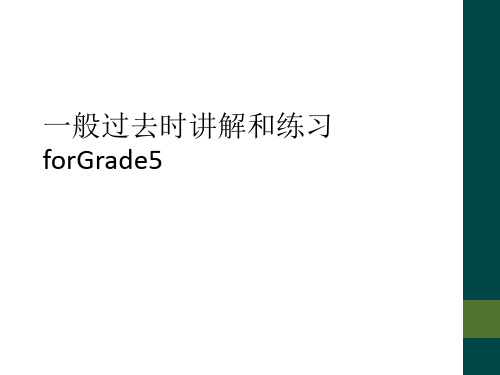
规则过去式ed的发音:
1. 在清辅音/p/, /k/, /f/ ,/s/ 等后加ed读清辅音 /t/ : asked cooked worked looked
talked helped
2. 在浊辅音及元音后加ed读浊辅音/d/ :
lived listened closed opened played
say—said: The teacher said,”look at the picture!” do—did: Simon did exercises in the morning. eat---ate: He ate a ice cream after class. come—came: The sun came down. go---went: Pupils went home after school. teach---taught: She taught us English last year.
一般过去时讲解和练习 forGrade5
1. 一般过去时用来描述在过去发生的动作或 存在的状态。 例如: It was Daming’s birthday yesterday. I bought you this book.
一般过去时的句子里常常有一个表示过 去时间的状语,如:
yesterday , last night (Sunday),at the weekend,in
We visited Big Ben and the London Eye. 否定句: We didn’t visit Big Ben and the London Eye. 一般疑问句: Did you visit Big Ben and the London Eye?
改写句子:
外研社版英语六年级下册 Module 6 形成性学习评测(含答案)

外研社版英语六年级下册Module 6 形成性学习评测一、选出下列每组单词中不同类的一项。
( ) 1.A.China B.America C.English ( ) 2.A.basketball B.football C.basket( ) 3.A.teacher B.mum C.dad( ) 4.A.bicycle B.space C.bus( ) 5.A.goes B.says C.was二、用所给单词的适当形式填空。
1.I _____ (ride) a bike to school last week.2.Can you _____ (give) it to me?3.Linda _____ (send) an email yesterday.4.Look! The monkey is _____ (eat) bananas.5.It _____ (look) very interesting.三、读句子,选出与句意相符的图片。
A.B.C.D.E.( ) 1.Did you buy me a pencil?( ) 2.This book is about animals.( ) 3.I bought a bicycle for my sister.( ) 4.My mother bought me a hen.( ) 5.I bought a basket yesterday.四、看图,补全句子。
1.This American _____took a man into _____ .2.Simon's mum bought Daming a _____ .五、连词成句。
1.bought, my, I, friends, these, for (.)_____________________________________________2.you, buy, what, did (?)_____________________________________________3.you, I, this, book, bought (.)_____________________________________________4.space, it, about, travel, is (.)_____________________________________________5.she, hen, basket, in, put, the, the (.)_____________________________________________六、选择合适的句子补全对话。
中考英语定语从句关系词辨析单选题30题
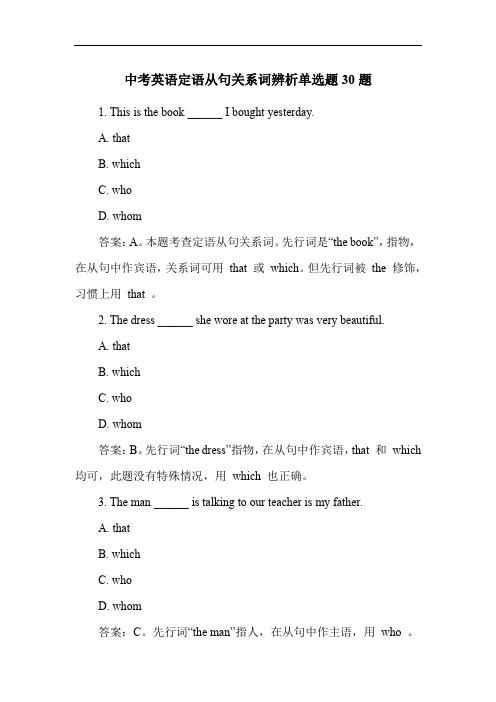
中考英语定语从句关系词辨析单选题30题1. This is the book ______ I bought yesterday.A. thatB. whichC. whoD. whom答案:A。
本题考查定语从句关系词。
先行词是“the book”,指物,在从句中作宾语,关系词可用that 或which。
但先行词被the 修饰,习惯上用that 。
2. The dress ______ she wore at the party was very beautiful.A. thatB. whichC. whoD. whom答案:B。
先行词“the dress”指物,在从句中作宾语,that 和which 均可,此题没有特殊情况,用which 也正确。
3. The man ______ is talking to our teacher is my father.A. thatB. whichC. whoD. whom答案:C。
先行词“the man”指人,在从句中作主语,用who 。
4. The house ______ we live in is very old.A. thatB. whichC. whoD. whom答案:A。
先行词“the house”指物,在从句中作宾语,因为先行词是物,所以不能用who 和whom ,又因为先行词被the 修饰,习惯上用that 。
5. The story ______ he told me was very interesting.A. thatB. whichC. whoD. whom答案:A。
先行词“the story”指物,在从句中作宾语,先行词被the 修饰,用that 。
6. The man ______ is talking to our teacher is my father.A. whoB. whomC. whichD. whose答案:A。
新标准英语六年级第八册第六模块复习与练习
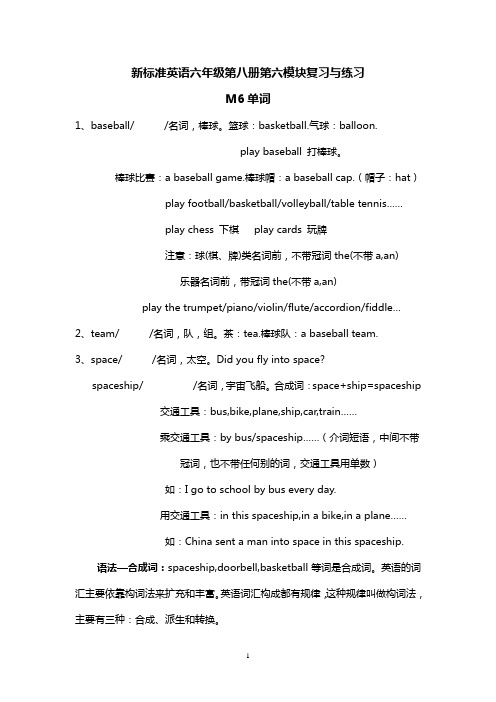
新标准英语六年级第八册第六模块复习与练习M6单词1、baseball/ /名词,棒球。
篮球:basketball.气球:balloon.play baseball 打棒球。
棒球比赛:a baseball game.棒球帽:a baseball cap.(帽子:hat)play football/basketball/volleyball/table tennis……play chess 下棋 play cards 玩牌注意:球(棋、牌)类名词前,不带冠词the(不带a,an)乐器名词前,带冠词the(不带a,an)play the trumpet/piano/violin/flute/accordion/fiddle…2、team/ /名词,队,组。
茶:tea.棒球队:a baseball team.3、space/ /名词,太空。
Did you fly into space?spaceship/ /名词,宇宙飞船。
合成词:space+ship=spaceship交通工具:bus,bike,plane,ship,car,train……乘交通工具:by bus/spaceship……(介词短语,中间不带冠词,也不带任何别的词,交通工具用单数)如:I go to school by bus every day.用交通工具:in this spaceship,in a bike,in a plane……如:China sent a man into space in this spaceship.语法—合成词:spaceship,doorbell,basketball等词是合成词。
英语的词汇主要依靠构词法来扩充和丰富。
英语词汇构成都有规律,这种规律叫做构词法,主要有三种:合成、派生和转换。
合成词:由两个或两个以上的词合在一起而成为一个新词,这种构词法称为合成法。
合成词的词义通常能从词面看出。
合成词的主要方式:①合成名词:black+board→blackboard黑板(形容词+名词);bed+room→ bedroom卧室(名词+名词);play+ground→playgroud操场(动词+名词);reading+room→ readingroom阅览室(动名词+名词);over+coat → overcoat大衣(副词+名词);②合成形容词:every+day→everyday每一天(形+名);hard+working →hardworking勤劳的(副+动名词);③合成副词:some+times →sometimes有时(形+名);for+ever→ forever永远(介+副);④合成代词:some+body →somebody某人(不定代词+名词)。
六年级新标准英语第八册期中测试题

六年级新标准英语第八册期中测试题第一卷I按要求写出下列单词的相应形式。
1.shine(现在分词)2.photo(复数)3.noise(形容词)4.buy(过去式)5.get(现在分词)6.cent(同音词)7.sun(形容词) 8.give(过去式) 9.watch(单三)10.right(反义词)II用单词的恰当形式填空。
11.He is (fly) his kite,but it’s starting to rain12.Whocan help (she)?13.The sun is (shine).14.Look!The ducks (eat) our picnic.15.Can you (ride) a bike?16.Sam (play) basketball every afternoon.17.They like (play) football in the afternoon.18.It’s going to(rain) soon.19.I (buy) my friend a book yesterday.20.I want (wear) my dress ,because it’s hot.III 翻译短语。
21$3.25 22.吹小号23.拾起24. 围着湖边散步25. 看起来饿了26. 飞走27. 打棒球28. 举行生日聚会29. 在水里游泳30. 打扫楼梯IV单项选择。
31.Lingling can play basketball, but she can’t play guitar. A.the,X B.the, the C.X, theD.X, X32.Simon’s dog in, too. e es ing ed33.We a picnic in the park yesterday. A.have B.has C.had D.having34.-What do you want to ? –I want milk. A.eat B.drink C.eating D.drinking35.The birds are singing the trees. A.in B.on C.at D.up36.Daming is a birthday party. A.have B.has C.having D.had37.It’s for baseball. A.play B.playing C.played D.plays38.I bought you this book America. A.on B.for C.about D.in39.She a hot dog and a cola. A.want B.wants C.wanting D.wanted40.How milk does she want?. A.many B.much C.some D.anyV 连词成句并译成汉语。
新概念2第80课课后练习题答案

新概念2第80课课后练习题答案1.关键句型练习答案C 1 shall have been workinghave finishedD 1 had to goshould/ought to buyshould/ ought to have telephoned2.难点练习答案1 shop assistant hung hanged3.多项选择题答案1. b根据课文第3-4行If the Houses of Parliament had not been burned down in 183可以判断只有b.符合课文内容,其他3个选择都与课文实际内容不符。
2. d根据课文第8行Officials from Greenwich Observatory have the clock checked twice a day 可以判断只有d与课文事实相符,其他3个选择都与事实不符.课文中用的是have sth.done 的形式,那么就是说是official让别人来检查clock, 但是检查clock 的也可以是official啊, 某个official让另外一个人去检查,这个人不是他本人,是另外的officail 也是可以的啊.3. b本句前半句陈述的是一个公认的事实,后半句则表示一个经常性或习惯性的动作,应该用一般现在时才符合逻辑,即“每当你到伦敦的时候”。
a. will visit c. have visited , d. will be visiting 这3个选择时态都不对,只有b. visit 是一般现在时,最符合语法,所以应该选b.4. b只有选b. 最符合题目意思,符合语法。
a. famousest 不是正确的最高级形式,famous 的最高级应该是the most famous; c. the more famous:比较级前不应该有定冠词,另外本句也没有表示比较的连词than; d. famouser 不是正确的比较级形式。
buy的用法及句型

buy的用法及句型“buy”是一个常见的动词,主要表示“购买”的行为。
以下是“buy”的基本用法和一些常见句型:1.基本用法:•buy something:买某物。
例如:“I want to buy a new car.”(我想买一辆新车。
)•buy something from somebody:从某人那里买某物。
例如:“I bought this book from my friend.”(我从我朋友那里买了这本书。
)•buy something for somebody:为某人买某物。
例如:“My mother bought a gift for me.”(我妈妈给我买了一个礼物。
)2.常见句型:•Where did you buy it?:你在哪里买的?•What did you buy?:你买了什么?•How much did you pay for it? 或者How much did it cost?:你付了多少钱?•I bought it for + 金钱:我花了……钱买的。
例如:“I bought it for 100 yuan.”(我花了100元买的。
)•I’ll buy it.:我买了。
这通常是在决定购买某物后说的。
•Can I buy you a drink?:我可以请你喝一杯吗?这是一种常见的社交用语,表示想为对方付钱买饮料。
3.进阶用法:•buy into something:相信并接受某个想法或概念。
例如:“I’m not sure I buy into that theory.”(我不确定我是否接受那个理论。
)但请注意,这种用法并不是表示购买的实际行为,而是表示对某种观点或理论的接受程度。
•buy somebody’s story/excuse/explanation等:相信某人的故事、借口或解释。
例如:“The jury didn’t buy the defendant’s story.”(陪审团不相信被告的故事。
赵彦 教案 I bought a book for you

I bought a book for you.英语组赵彦【学生分析】学生在以往的学习中已经学习了有关动词的过去式的用法,有了一定的基础,因此主要是使他们能够在具体的情境中来运用所学语言进行交际。
而且六年级的学生对生活中的事情有一定的体验,并且具备了一定的语言表达能力和想象能力,因此进行对话交际并不困难,但对于他们来讲还要强化书写。
【设计理念】英语课程的目标是培养学生的综合语言运用能力。
在本课的设计中,采用多种教学形式,并与信息技术相整合,听说读写训练相结合,设计贴近学生实际的教学活动,引导他们积极地参与学习活动。
一、教学目标1、知识目标:a.能够听说并通过短时记忆能够拼读单词space travel;能够听说interested,并初步了解interested和interesting的含义和区别;能够听说并了解spaceship的含义,并初步了解合成词。
b.通过复习练习,能够进一步巩固和掌握以下动词的过去式:do-did give-gave buy-bought send-sent make-madec.能够听说读并了解以下功能句的含义:I bought a book for you. Who gave it to you? Your mum gave it to me.d. 能够听说读并理解本课对话语篇。
2、能力目标:a.能够在理解课文的基础上找出Simon的妈妈送礼物给Daming时和Daming 的对话以及Simon想知道谁送礼物给Daming时和Daming的对话。
b.能够分角色朗读对话:I bought a book for you. Thank you. Who gave it to you? Your mum gave it to me.c. 能够用所给的图片改编对话I bought a book for you. Thank you. Whogave it to you? Your mum gave it to me.d.能够在理解对话语篇的基础上,回答问题。
Module6 Unit1 I bought you this book
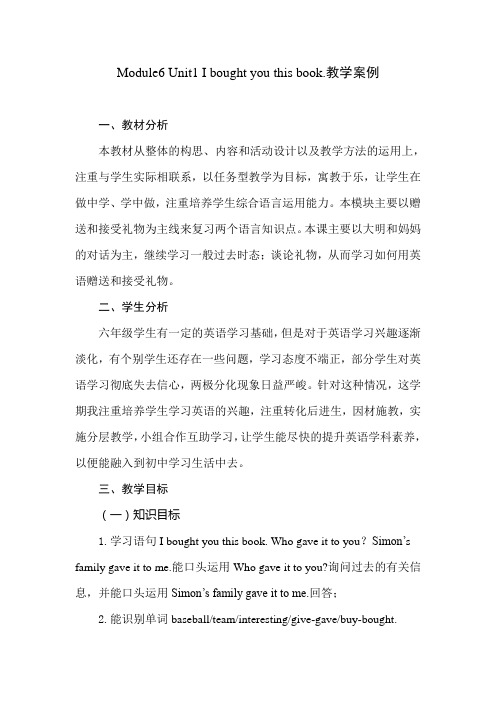
Module6 Unit1 I bought you this book.教学案例一、教材分析本教材从整体的构思、内容和活动设计以及教学方法的运用上,注重与学生实际相联系,以任务型教学为目标,寓教于乐,让学生在做中学、学中做,注重培养学生综合语言运用能力。
本模块主要以赠送和接受礼物为主线来复习两个语言知识点。
本课主要以大明和妈妈的对话为主,继续学习一般过去时态;谈论礼物,从而学习如何用英语赠送和接受礼物。
二、学生分析六年级学生有一定的英语学习基础,但是对于英语学习兴趣逐渐淡化,有个别学生还存在一些问题,学习态度不端正,部分学生对英语学习彻底失去信心,两极分化现象日益严峻。
针对这种情况,这学期我注重培养学生学习英语的兴趣,注重转化后进生,因材施教,实施分层教学,小组合作互助学习,让学生能尽快的提升英语学科素养,以便能融入到初中学习生活中去。
三、教学目标(一)知识目标1.学习语句I bought you this book. Who gave it to you?Simon’s family gave it to me.能口头运用Who gave it to you?询问过去的有关信息,并能口头运用Simon’s family gave it to me.回答;2.能识别单词baseball/team/interesting/give-gave/buy-bought.(二)能力目标1.能谈论过去发生的事情;2.学习如何用英语来表达赠送和接受礼物。
(三)情感目标教育同学们要爱我们的父母和同学,在他们生日或节日时,赠送一些小礼物表达孝心或友情,珍惜亲情和友情,学会感恩。
四、教学重难点教学重点:掌握重点句型I bought you this book. Who gave it to you? Simon’s family gave it to me. 能口头运用这些句型进行问答练习;理解并掌握如何表达过去发生的事情。
小学英语精讲精析 I bought a book for you
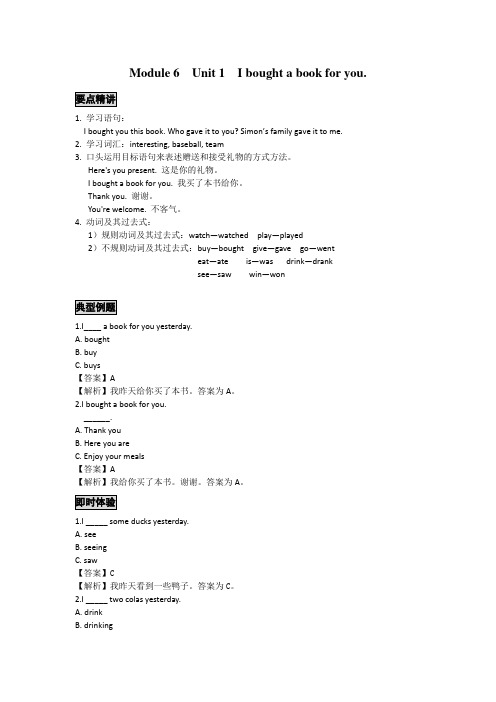
Module 6 Unit 1 I bought a book for you.1. 学习语句:I bought you this book. Who gave it to you? Simon’s family gave it to me.2. 学习词汇:interesting, baseball, team3. 口头运用目标语句来表述赠送和接受礼物的方式方法。
Here's you present. 这是你的礼物。
I bought a book for you. 我买了本书给你。
Thank you. 谢谢。
You're welcome. 不客气。
4. 动词及其过去式:1)规则动词及其过去式:watch—watched play—played2)不规则动词及其过去式:buy—bought give—gave go—wenteat—ate is—was drink—dranksee—saw win—won1.I____ a book for you yesterday.A. boughtB. buyC. buys【答案】A【解析】我昨天给你买了本书。
答案为A。
2.I bought a book for you.______.A. Thank youB. Here you areC. Enjoy your meals【答案】A【解析】我给你买了本书。
谢谢。
答案为A。
1.I _____ some ducks yesterday.A. seeB. seeingC. saw【答案】C【解析】我昨天看到一些鸭子。
答案为C。
2.I _____ two colas yesterday.A. drinkB. drinkingC. drank【答案】C【解析】我昨天喝了两瓶可乐。
答案为C。
bought的用法
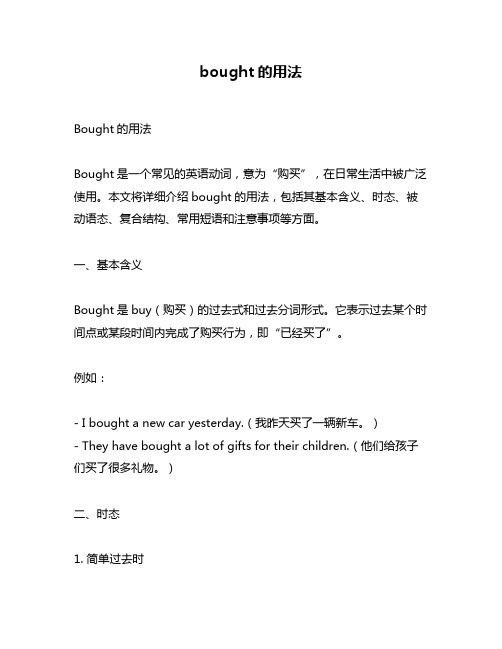
bought的用法Bought的用法Bought是一个常见的英语动词,意为“购买”,在日常生活中被广泛使用。
本文将详细介绍bought的用法,包括其基本含义、时态、被动语态、复合结构、常用短语和注意事项等方面。
一、基本含义Bought是buy(购买)的过去式和过去分词形式。
它表示过去某个时间点或某段时间内完成了购买行为,即“已经买了”。
例如:- I bought a new car yesterday.(我昨天买了一辆新车。
)- They have bought a lot of gifts for their children.(他们给孩子们买了很多礼物。
)二、时态1. 简单过去时Bought在简单过去时表示完成的动作或状态。
通常与时间状语连用,如yesterday(昨天)、last week(上周)等。
例如:- She bought a dress last Sunday.(她上周日买了一件裙子。
)- We bought some vegetables at the market yesterday.(我们昨天在市场上买了些蔬菜。
)2. 过去完成时Bought在过去完成时表示先前已经完成的动作或状态。
例如:- By the time I arrived, he had already bought the tickets.(我到达时,他已经买好票了。
)- The company had bought a lot of new equipment before the financial crisis.(公司在金融危机前已经购买了很多新设备。
)三、被动语态Bought可以用于被动语态,表示动作的承受者是主语,而不是执行者。
例如:- The book was bought by my friend.(这本书是我朋友买的。
)- The house has been bought by a wealthy businessman.(这栋房子已经被一位富有的商人买下了。
最新人教版六年级下册英语期末测试试卷以及答案(2套题)
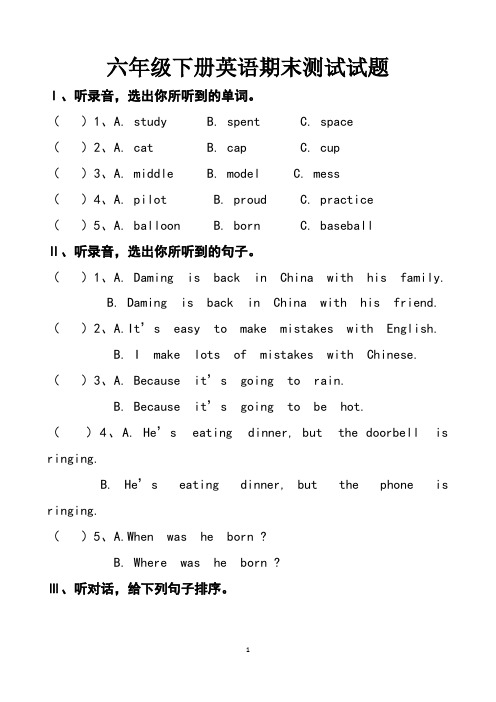
六年级下册英语期末测试试题Ⅰ、听录音,选出你所听到的单词。
()1、A. study B. spent C. space()2、A. cat B. cap C. cup()3、A. middle B. model C. mess()4、A. pilot B. proud C. practice()5、A. balloon B. born C. baseballⅡ、听录音,选出你所听到的句子。
()1、A. Daming is back in China with his family.B. Daming is back in China with his friend. ()2、A.It’s easy to make mistakes with English.B. I make lots of mistakes with Chinese.()3、A. Because it’s going to rain.B. Because it’s going to be hot.()4、A. He’s eating dinner, but the doorbell is ringing.B. He’s eating dinner, but the phone is ringing.()5、A.When was he born ?B. Where was he born ?Ⅲ、听对话,给下列句子排序。
()Thanks.()Can I have this cap?()But you can have this one.()Sorry , Mum. That one is for Sam’s little brother, Tom.()Ahh.Ⅳ、听录音,选出你所听到的句子的正确答语。
()1、A. I bought you this book.B. It’s about animals.C.It looks interesting.()2、A. Yes , I do. B. Yes , I did. C. Yes , she did.. ()3、A. I’m tired. B. I’m sad. C. I’m happy.()4、A. Yes ,he is. B. Yes , it is. C. No , he isn’t. ()5、A. Helen Keller. B. Louis Braille. C.Yang Liwei.笔试部分Ⅰ、根据要求填写单词。
新概念英语第二册_第一单元课后练习答案

新概念英语第二册第一单元课后练习答案Lesson1Key to Summary writingThe writer went to the theatre last week.He did not enjoy the play.A young man and a young woman were sitting behind him.They were talking loudly.The writer could not hear the actors.He turned round.‘I can't hear a word!’he said.‘This is a private conversation!’the young man said.Key to KS ExercisesAI(1)got(2)very angry(3).I(1)could not hear(2)the actors(3).I(1)turned round(2).I(1)looked at(2)the man and the woman(3)angrily(4).They(1)did not pay(2)any attention(3).In the end(6),I(1)could not bear(2)it(3).I(1)turned round(2)again(6).‘I(1)can't hear(2)a word(3)!’I(1)said(2)angrily(4).‘It(1)is(2)none of your business(3)’,the young man(1)said(2)rudely(4).‘This(1)is(2)a private conversation(3)!’B1I enjoyed the film yesterday.2I listened to the news carefully.3The man played the piano well.4The children played games quietly in their room yesterday.5He opened the door quietly.6He left immediately.7He planted a tree in the corner of the garden.8He read the letter quickly in his office before lunch.9I borrowed a book from the library this morning.10The cook spoilt the soup.11We stay at home on Sundays.12There are a lot of people at the bus stop.13The little boy ate greedily an apple in the kitchen this morning.14She draws beautifully.15I like music very much.16They built a new school in our village last year.17The match ended at four o'clock.18She received a letter from her brother last week.Lesson2Key to Summary writingThe writer always gets up late on Sundays.He got up late last Sunday.Then his auntLucy telephoned.She had arrived by train.She was coming to see him.‘I'm still having breakfast,’he said.His aunt was very surprised.It was one o'clock.Key to KS ExercisesA1are playing…play…is kicking…is running2‘What are you doing?’my landlady asked.‘I'm leaving,Mrs.Lynch,’I answered.‘Why are you leaving?’she asked.…‘friends never come to visit me…I frequently go to bed…I rarely listen…I always feel cold…’B1She rarely answers my letters.2We never work after six o'clock.3The shops always close on Saturday afternoons.4Do you always go to work by car?5Our teacher frequently collects our exercise books.6We sometimes spend our holidays abroad.7I often buy CDs.8Do you ever buy CDs?Key to SD Exercises1What a wonderful garden(this is)!2What a surprise(this is)!3What a lot of trouble he is causing!4What wonderful actors(they are)!5What a hard-working woman(she is)!6What a tall building(it is)!7What a terrible film(it is)!8What a clever boy you are!9What a pretty girl(she is)!10What a strange guy(he is)!Lesson3Key to Summary writingPostcards always spoil the writer's holidays.He spent his holidays in Italy last summer. He thought about postcards every day.He did not send any cards to his friends.He bought thirty-seven cards on the last day.He stayed in his room all day.He did not write any cards.Key to KS ExercisesA went(1.1);visited(I.2);sat(I.2);taught(1.2);lent;read(1.3);did not understand; thought(1.4);passed(1.5);did not send(1.5);made;got up(1.6);bought(1.7); spent(1.7);did not write(1.8)C…Roy died last year…left me…spent a lot of money…bought one or two…never went to the cinema…stayed at home…listened to music…often lent CDs…they kept them…lost many CDs…Key to SD Exercises1He paid some money to the shopkeeper.2He handed the prize to me.3The waiter brought the man a bottle of beer.4He sold me all his books.5The shop assistant found me some curtain material.6He did a big favour for me.7She showed her new hat to her husband.8She promised the finder a reward.9He gave some advice to his son.10His uncle left some money to/for him.11He is teaching us English.12I bought you this bunch of flowers.13Bring me that book please.14He offered a cigarette to me.15Read the first paragraph to me.16I've ordered you some soup.17I owe a lot of money to him.18Pass your father the mustard.Lesson4Key to Summary writingThe writer.has just received a letter from his brother,Tim.Tim is an engineer.He has been in Australia for six months.He has already visited many places.Now he is in Alice Springs:Tim has never been abroad before.He is enjoying his trip very much. Key to KS ExercisesA1I have just had breakfast.2He has been in prison for six months.3The police have not caught the thief yet.4You have(already)asked that question three times(already).5Have you ever been to Switzerland?6I have never been to Switzerland.7He is a wonderful runner.He has broken two records so far.8I haven't seen George lately.C1He has just left the house.2He has just had breakfast.3She has just written a letter.4My sister has just turned on the radio.5My mother has just made the bed.6She has just bought a new hat.D1He hasn't washed the dishes yet.2She hasn't made the beds yet.3He hasn't combed his hair yet.4She hasn't swept the carpet yet.5We haven't read‘Macbeth’yet.E1Have you seen the new play at‘The Glob’yet?2Have you taken your holidays yet?3Have you read this book yet?4Have you done your homework yet?5Have you finished your work yet?Key to SD Exercises1received2received3took4taken5takeLesson5Key to Summary writingMr.Scott has opened his second garage in Pinhurst.His first garage is in Silbury. Silbury is five miles away.Mr.Scott cannot get a telephone for his new garage.He has bought twelve pigeons.They carry messages from one garage to the other in three minutes.Key to KS ExercisesAWhat happened:carried(1.4);covered(1.5)What has happened:has just bought(1.1);has just bought(11.3-4);has sent(1.6); has begun(1.8)C1What did you buy…?5They have already left.2he has never lent…6When did you lose…?3Have you burnt…?7Did you listen…?4He fought…8We have just won…Key to SD ExercisesA1On the way4in this/a way2in the way5in the way3By the wayB1There is a spare wheel in the back of the car.2I always go on excursions in my spare time.3‘Have you any old clothes to spare?’he asked.4The guest slept in our spare room.5‘Spare me!’begged the prisoner.Lesson6Key to Summary writingThe writer has just moved to a house in Bridge Street.A beggar knocked at her dooryesterday.She sang songs.The writer gave him a meal and a glass of beer in return for this.The beggar’s name is Percy Buttons.He calls at every house once a month. Key to KS ExercisesAsome a some a a a a/some some a a a a some some an a/someCa×a a a the×a the the a a×a a aD1I found an old coin in the garden.2I put some sugar in my tea.3I cut some wood for the fire.4I bought a newspaper yesterday.5I made some coffee.6I like the curtains in this room.Key to SD ExercisesAout over off atBknock out;knock off;knock20%off the priceLesson7Key to Summary writingDetectives were waiting at the airport all morning.They were expecting a valuable parcel of diamonds from South Africa.Two men took the parcel into the Customs House after the arrival of the plane.Two detectives opened it.The parcel was full of stones and sand.Key to KS ExercisesAdetectives were waiting(1.1);They were expecting(1.2);detectives were waiting (1.5);others were waiting(1.6);two detectives were keeping guard(11.7-8)B1When the plane arrived,some of the detectives were waiting inside the main building while others were waiting on the airfield.2When two of the detectives opened the parcel,two others were keeping guard at the door.C(sample answers)1I was getting into my bath when you telephoned me.2I was reading Hamlet when you saw me in the library this morning.3I was saying that you must see the new film when you interrupted me.D1was leaving…arrived2worked/was working…was sitting/sat3was walking…met4was reading…heard5was preparing…set/was setting6dropped…spokeKey to SD Exercises1He gave all his books away.2She woke the children up early this morning.4They cut the king's head off.5Put your hat and coat on.7Help me to lift this table up.8Take your shoes off and put your slippers on.11They have pulled the old building down.12Make your mind up.14She threw all those old newspapers away.Lesson8Key to Summary writingJoe Sanders has the best garden in town.He wins‘The Nicest Garden Competition' each year:Bill Frith also has a fine garden.Joe's is better.The writer's garden is terrible.He always wins a prize for the worst garden in the town.Key to KS ExercisesA1Mary's handwriting is worse than Jane's.2Caroline's handwriting is worse than Mary's and Jane's.3Caroline's dress is/was more expensive than Jane's.4Mary's dress is/was more expensive than Jane's and Caroline's.B…has the most beautiful garden in our town…'The Nicest Garden Competition'…garden is larger than Joe's…works harder than Joe and grows more flowers and vegetables…garden is more interesting…for the worst garden in the town!D1in2of3of4inKey to SD ExercisesA1believes2was3triesB Sentences2,3and5Lesson9Key to Summary writingWe went to the Town Hall on New Year's Eve.There were a lot of people there.The Town Hall clock would strike twelve in twenty minutes'time.It stopped at five to twelve.It refused to welcome the New Year.Then the crowd began to laugh and sing. Key to KS ExercisesA1We went to the Town Hall on Wednesday evening/New Year's Eve.2The clock would strike twelve in twenty minutes'time.3The clock stopped at five to twelve.B1in2On3during/in4in5at6on…in7in8at…in9untilC(sample answers)1The match will begin at2They bought their house in1980.3The shop is closed from one till two.4The children went to school in the morning.5He'll finish school in two years'time.6Let's go for a walk in the evening.7He went to church on Sunday.Key to SD ExercisesA1No,I haven't any/have no money.2No,I didn't go anywhere/went nowhere in the.holidays.3No,I didn't buy anything/bought nothing this morning.4No,there wasn't anybody/was nobody present when the accident happened.BHe has no hobbies.He goes nowhere.He sees nobody.He is interested in nothing-except food!Lesson10Key to Summary writingWe own an old clavichord.It was made in1681.My grandfather bought the instrument many years ago.A visitor damaged it recently.She tried to play jazz on it! She broke two of the strings.A friend of my father's is repairing it now.Key to KS ExercisesA1Our old musical instrument is called a clavichord.2It was made in Germany.3It is kept in the living room.4It was bought many years ago.5It was damaged recently.6Two of the strings were broken.7My father was shocked.8We aren't allowed to touch it.9The clavichord is being repaired.Key to SD ExercisesA1of2in3fromB1He borrowed a record of mine.2She showed me a picture of John's.3It was an idea of hers.4A letter of yours was found on my desk.5Some friends of theirs came to see me.Lesson11I was having dinner at a restaurant.I saw Tony Steele after a while.He always borrows money from his friends.Tony sat at my table.I asked him to lend me twenty pounds.He gave me the money at once.He wanted me to pay for his dinner.Key to KS ExercisesAa he is now working(1.2)b he gets(1.3);he always borrows(1.3);never pays it back(1.4)c came in…worked(11.1-2);Tony saw(1.4);came and sat(1.4);I asked him(1.6);he gave me(1.7);Tony said(1.8)d He has never borrowed(1.5);I have never borrowed(1.7)e I was having(1.1);he was eating(1.6)C1gets…got2have not had3was writing…talked/were talking4am typing5passed/were passingDThe Taj Mahal was built…after he became/had become ruler,his wife…died.The Taj Mahal was built in her honour.Experts were called in…The Taj Mahal,which was begun in1632and(was)completed in1654,cost a fortune…it has been visited by…Key to SD ExercisesaA1The officer ordered the men to fire at the enemy.2He wants his wife to wear this dress.3She wants us to explain it.4I cannot allow him to enter the room.B(sample sentences)1He asked me to help him.2We preferred her to stay at home.3He taught me to speak English.4My mother wished me to collect the laundry.5Do you want her to visit you?b1salary2lent…salary/wages3borrowed4wages5wagesLesson12Key to Summary writingWe shall meet our neighbour,Captain Charles Alison,at Portsmouth Harbour early tomorrow morning.He will be in his small boat,Topsail.He will leave at eight o'clock. We shall say goodbye to him.He will take part in an important race across the Atlantic.Key to KS ExercisesA will sail(1.1);shall meet(1.2);will be(1.3);will set out(11.4-5);shall have(1.5); shall see(1.5);shall say(1.6);will be(1.6);will take part(1.7)C I shall go to the theatre…Reg and I shall see the first performance…the producer will give a short speech.He will speak to…The play will be very…people will enjoy it very much.Key to SD Exercises1He is not back yet.He will be back in ten minutes.2A new play is on at the Globe Theatre.3When the concert was over,we went home.4They will set out/off very early tomorrow morning.(Be off is also possible.)5You can't take the exam yet.You are not up to it.6He will be away from home for two months.7She swam across the English Channel and set up a new world record.Lesson13Key to Summary writingThe Greenwood Boys are pop singers.They will be coming here tomorrow.Most of the young people in the town will be meeting them at the station.They will give five performances.The police will be trying to keep order as usual.Key to KS ExercisesAwill be arriving(1.2);will be coming(1.3);will be meeting(1.4);will be singing(1.5); will be staying(1.6);will be trying(1.8)C1I'll be ironing the clothes.2The train will be arriving in a few minutes.3We'll be seeing you in the morning.4We'll be watching the match.5He'll be correcting exercise books.Key to SD Exercises1It's George's.2It's Jean's.3It's that woman's.4I like Keats'poetry best.5They're the children's.6They're the soldiers'.7I'll leave in six hours'time.8There was a hundred pounds'worth of damage.Lesson14Key to Summary writingThe writer gave a lift to a young man in the south of France last year.They greeted each other in French.Apart from a few words,the writer doesn't speak any French. They sat in silence.At the end of the journey the young man asked,‘Do you speak English?’He was English himself.Key to KS ExercisesA1I drove on to the next town after I had left a small village.2I said good morning to him in French as soon as he had got into the car.3I had nearly reached the town,when the young man said,‘Do you speak English?’C1After she had written the letter,she went to the post office.2After he had had dinner,he went to the cinema.3When I had fastened my seat belt,the plane took off.4We did not disturb him until he had finished work.5As soon as he had left the room,I turned on the radio.6He had been very ill before he died.D1regretted2had begun/began3arrivedKey to SD Exercises1Except for2both of3Apart from4asked…ask for5either of…askedLesson15Key to Summary writingMr.Harmsworth wanted to see me.I felt very nervous.I went into his office.He said that business was bad.The firm could not pay such large salaries.Twenty people had already left.He didn’t ask me to leave.He offered me an extra thousand pounds a year.Key to KS ExercisesB1.told would come2.said had cut3.told had never4.did say had done/would do/did5.did tell had bought6.said could not7.said had worked8.told had never written9.did say were10.said would waitKey to SD ExercisesStudy office nervous afford irritableLesson16Key to Summary writingTraffic police usually give you a ticket if you park your car in the wrong place.The writer found a polite note on his car during a holiday in Sweden.The traffic police wanted him to pay attention to their street signs.No one can fail to obey a polite request.Key to KS ExercisesA The word if has been used four times.C1rains2will never pass3is4will get5enjoys6isD…if I listen to the radio…If I do something wrong,don't shout at me.If the house is untidy,don't blame me.If you want me to do something,don't forget to say ‘please’.If I am playing a nice game,don't send me to bed.If I ask for something…If it is cold don't put the cat out…Key to SD Exercises1pay attention2remind3are knocking4look after5Remember meLesson17Key to Summary writingMy aunt Jennifer is an actress.She is over thirty years old.She often appears on the stage as a young girl.Jennifer will act the part of a girl of seventeen in a new play soon.She never tells anyone how old she really is.Key to KS ExercisesAShe must be(1.1);Jennifer will have to take(1.3);she must appear(1.4);she had to wear(11.5-6);it must be terrible(11.7-8)C1You must/will have to see a doctor.2Must you/Do you have to make so much noise?3She said we must/had to/would have to stay here.4I must/have to have some help.5I've had to go out last night.Key to SD ExercisesA1in the position of2because3At the time whenB1grow2suit3costume4dressLesson18Key to Summary writingThe writer had lunch at a village pub.She could not find her bag after her meal.She could not pay the bill.The landlord soon found it for her.His dog had taken it into the garden.Key to KS ExercisesA1I looked for my bag after I had had lunch at a village pub.2I had left my bag on a chair beside the door.3The landlord asked me,‘Did you have a good meal?’4I answered,‘I can't pay the bill because I haven't got my bag.’5The dog had taken the bag into the garden.CSentences2,3,5,7,8,10,11.Key to SD ExercisesA1back2away3in4inB1Besides2besideLesson19Key to Summary writingThe play was going to begin at any moment.I asked for two tickets.There were none left.Susan and I were disappointed.Just then,a man hurried to the ticket office.He returned two tickets.They were for next Wednesday's performance.I bought them. Key to KS ExercisesA may begin(1.1);may have begun(1.2);May I have(1.3);Can I return(1.8);Could I have(1.11);I might as well have(1.13)Key to SD Exercises1I have not seen…2There aren't…3He does not…you are…4She didn't tell…she hadn't…5I shan't stay…6He won't do…he's told7When will I…8What have you…You have broken…9He is…He has just come…10I can't understand…he has not…11You must not believe…12I was not…You were not…13That man has been…14They had not seen…Lesson20Key to Summary writingFishing is the writer's favourite sport.Some unlucky fishermen catch old boots and rubbish.The writer is not so lucky.He never catches anything.He is not really interested in fishing.Sitting in a boat and doing nothing at all is the only thing that interests him.Key to KS ExercisesAFishing(1.1);catching(11.1-2);catching(1.3);having spent(1.5);fishing(1.6); fishing…sitting(1.8);doing(1.9)C1He went out of the restaurant without paying the bill.2She bought a pair of boots instead of getting a pair of shoes.3She was afraid of spending the night alone.4After hearing/having heard the news,she fainted.5Think carefully before answering my question.6On seeing the plane coming towards me,I dashed for cover.Key to SD Exercises1realized2It's…understand…its3exciting4interesting5exciting6interestedLesson21Key to Summary writingThe writer is slowly going mad.He lives near an airport.Passing planes can be heard night and day.Most of his neighbours have left their homes.He has been offered money to leave.He is determined to stay.Everyone says he must be mad.They are probably right.Key to KS ExercisesA…passing planes can be heard(1.2);it could not be used then(1.3);a hundred people must have been driven away(11.4-5);this house will be knocked down by a passing plane(11.6-7);I have been offered a large sum of money(1.7)C1A message will be sent immediately.2All these goods must be sold.3I told you the parcel would be received in time.4The letter has to be delivered by hand.5Your letter must have been lost in the post.Key to SD ExercisesA(sample answers)The dog drove the sheep out of the field.The police drove the crowds back.I drove my car into the garage.B1home2houses3house4homeLesson22Key to Summary writingJane crossed the Channel last year.She threw a bottle into the sea.It contained apiece of paper with her name and address on it.Ten months later,she received aletter from a girl in Holland.They write to each other regularly now.They send theirletters by post.1from9from17from25in33on41on49of2on10in18of…On26on34on42on50of3in11on…In19on27on35in43of51on4on12of20of…Of28from36from44in52of5from13in21of29on37on45in53from6from14on22of/from30in38on46in54in7of15of23of31from39in47from8on16of24from32on40of48ofLesson23My sister will come to England next year.She will get a surprise if she comes.Wehave a new house in the country.I have invited my sister to stay with us.It is a verymodern house.It has got many large rooms and a lovely garden.Key to KS ExercisesC1wrote2had finished3breaks4shall/will goD1told…would2told…had lost3said…did not likeKey to SD Exercises1It2There3There4there5It6It7There8it9there10itLesson24Key to Summary writingI had just lost£50.I felt very upset.I told the manager about it.He could not do anything.He began to complain about this wicked world.Just then a girl came in with the money.She had found it outside my room.There is still some honesty in this world.Key to SD ExercisesA1received6salary11are16beside2on the7lend12pay attention to17It's…exciting3On the8asked for13Remember18understand4believes9Apart from14suit19home5of10an irritable15grow up20There isB1What a wonderful garden(this is)!2What a lot of trouble he is causing!3What a tall building(it is)!4What a clever girl you are!C1He handed the prize to me.2The waiter brought the man a bottle of beer.3I've ordered you some soup.4Bring me that book please!5She promised the finder a reward.D1I haven't any/have no money.2I didn't go anywhere/went nowhere in the holidays.3There wasn't anybody/was nobody present when the accident happened.E1It's George's.2It's that woman's.3I like Keats'poetry best.4They're the children's.5They're the soldiers'.F1off2back3up4over5on6awayG1I put my hat on.2I took my coat off.3He put the fire out.4They cut the king's head off.新概念英语第二册第一单元多项选择题详解Lesson11.b选b最为正确。
介词for和to的用法

介词for和to的用法介词for和to在英语中有不同的用法,我将从多个角度来解释它们的用法。
首先,介词for通常用于表示目的、目标或目的地。
例如,我们可以说"I bought this book for you"(我为你买了这本书),这里for表示这本书的目的是给你。
另外,for也可以表示时间、距离或数量。
比如,"I have been waiting for two hours"(我已经等了两个小时),这里for表示时间的持续。
另外,for还可以表示目的或理由,比如"I apologized for my mistake"(我为我的错误道歉),这里for表示道歉的理由。
而介词to则有更多的用法。
首先,它可以表示方向或移动。
比如,"I went to the store"(我去了商店),这里to表示移动的方向。
另外,to也可以表示接触或接近。
比如,"She handed the book to me"(她把书递给了我),这里to表示动作的接触。
此外,to还可以表示时间或事件的发生。
比如,"The party is from 6to 9"(派对从6点到9点),这里to表示时间的范围。
另外,to还可以表示目的或结果。
比如,"I am going to the library to study"(我去图书馆学习),这里to表示动作的目的。
总的来说,介词for和to在英语中有着不同的用法,它们可以根据句子的语境来灵活运用。
希望这些解释能帮助你更好地理解它们的用法。
外研版英语六年级下学期Module5_模块测试卷

Module5 模块测试卷听力部分一、听录音,给下列图片排序。
( ) ( ) ( ) ( ) ( )( ) ( ) ( ) ( ) ( )二、听录音,选出与所听到的单词同类的一项。
( ) 1. A. friend B. plane C. dream( ) 2. A. dark B. piano C. park( ) 3. A. cold B. sun C. weather( ) 4. A. run B. wind C. sky( ) 5. A. cheese B. coffee C. rice三、听录音,判断你所听到的内容与下列图片是(√)否(×)相符。
1. 2. 3. 4.( ) ( ) ( ) ( )5. 6.( ) ( )四、听录音,完成短文。
Daming is having a _______ party. He is playing the _______. He has to_______ because the _______ rings. Daming is playing the piano again. But he _______ again, because the _______ rings. Daming is playing it for the third time, but the _______ sings very _______.笔试部分一、英汉互译。
1. 做早操__________2. call out my name __________3. 醒来__________4. sing loudly __________5. 放风筝__________6. more friends __________7. 开始唱歌__________ 8. start to rain __________9. 读书__________ 10. know nothing __________二、选出不同类的一项。
教育部参赛_I bought you this book课件_何开斌
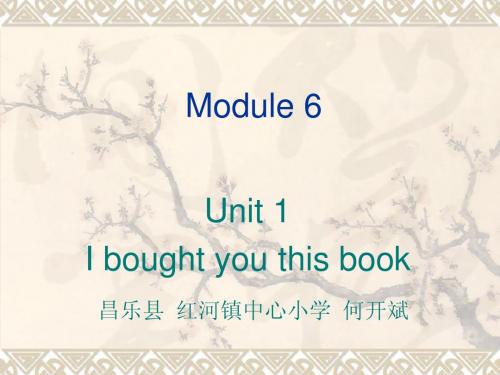
Daming and Simon __ to a baseball
game in America. They __ their bicycles. Then they __ the game. They __ their favourite team. Their team __ very well and they __ . Daming and Simon __ hot dogs and __ colas. It __ a great game.
Finally,
take out your presents and make a dialogue in your group.
Look and make a dialogue in pairs.
A:
I bought you a … B: Thank you.
C:
Who gave it to you? B: … gave it to me.
Listen
Listen and say.
A: I bought you this book about America. B: Thank you. It looks interesting. A: who gave it to you? B: Simon’s family gave it to me.
America. What did Simon’s family give Daming? Simon’s family gave Daming a baseball set. What did Daming buy for his friends? Daming bought some baseball caps for his friends.
- 1、下载文档前请自行甄别文档内容的完整性,平台不提供额外的编辑、内容补充、找答案等附加服务。
- 2、"仅部分预览"的文档,不可在线预览部分如存在完整性等问题,可反馈申请退款(可完整预览的文档不适用该条件!)。
- 3、如文档侵犯您的权益,请联系客服反馈,我们会尽快为您处理(人工客服工作时间:9:00-18:30)。
baseball caps
知识导入
Today is my friend Daming’s birthday. I bought a present for him. And just now I gave it to him.
buy---bought
I bought him
give---gave
知识总结
词组
a baseball team、baseball caps、 be back 、 a book about America
句子
1、I bought you this book about America. 2、It looks interesting. 3、Now we can have a baseball team. 4、Daming is back in China with his family.
Homework:
1.练习用英语赠送和接受礼物。 2.课本Part4 的练习:“Use the word in the boxes”
1. I bought this book for you.
• Who gave it to you?
2. Simon gave it to him.
• Who gave it to him?
Module6 Unit1
Daming is back in China with his family.
Daming: Look,Mum. I bought you this book about America. Daming’s Mum: Thank you. It looks interesting.(有趣的)
• 听录音,选择正确 的答案回答以下问 题。
ቤተ መጻሕፍቲ ባይዱ √
√
√
√ √
√
√
√
√
listen to the text again
要求: 1.找出不理解的单词和句子。 2.注意模仿录音中的读音,分角 色朗读课文。
1.Daming is back in China with his family. be bace 回来、回到 2.I bought you this book about America. a book about ‥‥一本关于‥的书 3. And now we can have a baseball team. can + 动词原形
知识回顾:学以致用
Use the word in the boxes.
rode ate was saw watched played drank went won
Daming and Simon ( went ) to a baseball game in America.
They (rode ) their bicycles. Then they (Watched ) the game. They (saw ) their favourite team .Their team ( played ) Very well and they( won ).Daming and Simon ( ate ) hot dogs and (drank) colas. It ( was) a great game.
Daming: And I bought these for my friends. Daming’s Mum: Caps?
Daming: Yes,baseball caps. Daming’s Mum: Can I have this cap? Daming: Sorry, mum. That one is for Sam’s little brother,Tom. Daming’s Mum: Ahh. Daming: But you can have this one. Daming’s Mum: Thanks.
知识回顾:连一连
• • • • • • • • • eat ride play drink see watch go win am、is • • • • • • • • • palyed rode drank was watched won saw ate went
Which sport do you like?
Daming’s Mum: What’s this.Daming? Daming: It’s for playing baseball. Daming’s Mum: Who gave it to you? Daming: Simon’s family gave it to me. Daming’s Mum: You love baseball. Daming: Yes! And now we can have a baseball team.
table tennis
running
high jump
football
swimming
basketball
a baseball
a baseball team
This baseball team is playing baseball.
listen to the text,and tick the right answers
• 授课人:石明珠 • 班 级:六· 一
What did you do yesterday?
1. I bought you this book yesterday .
I bought this book for you.
2. I gave you this book. I gave this book to you.
4.That one is for Sam’s little brother,Tom.
当堂检测: 1.I bought this book B you. A. to B. for C. about 2. Simon’s family gave it A me. A. to B. for C. in 3. It C interesting. A .look B. looking C. looks 4. We can have a baseball team .(棒球 队)
